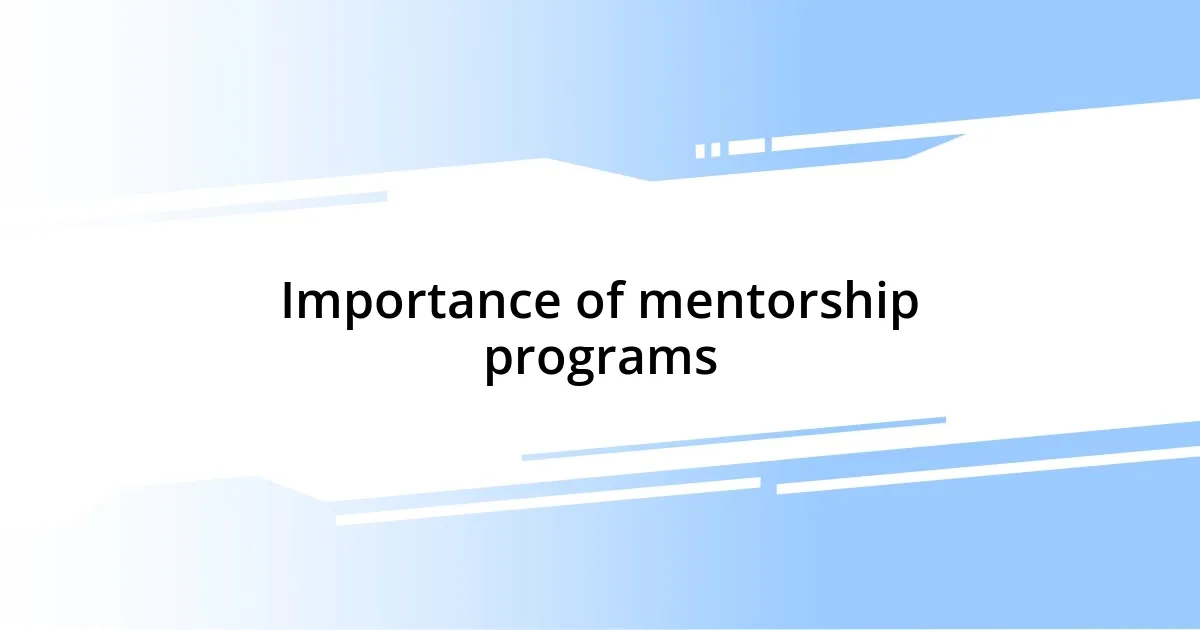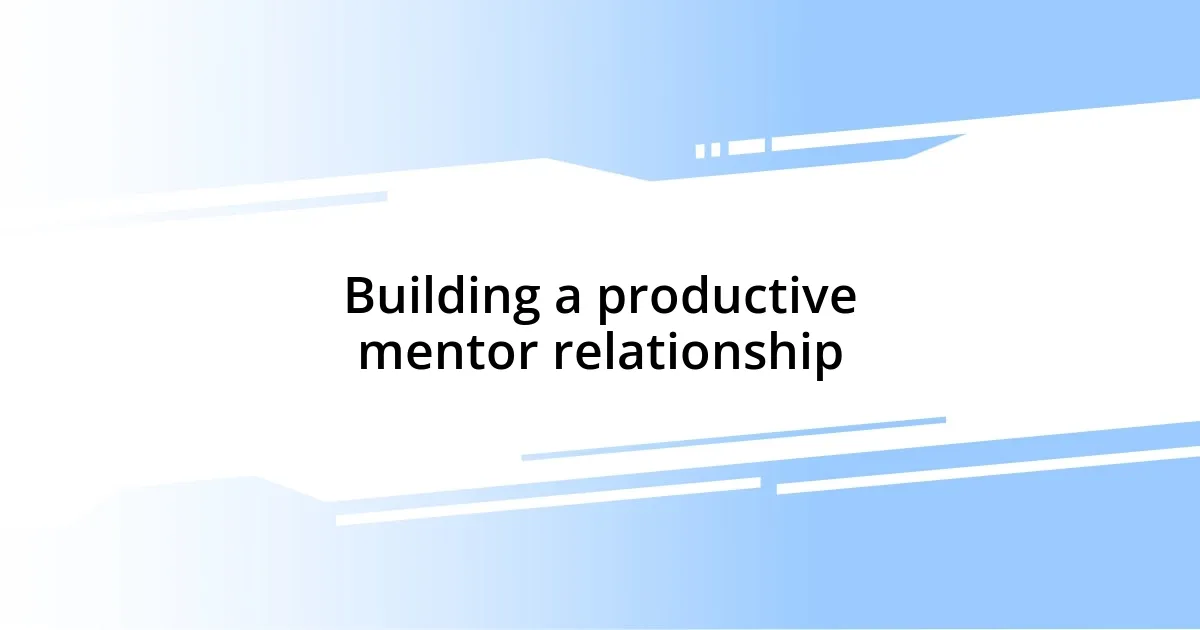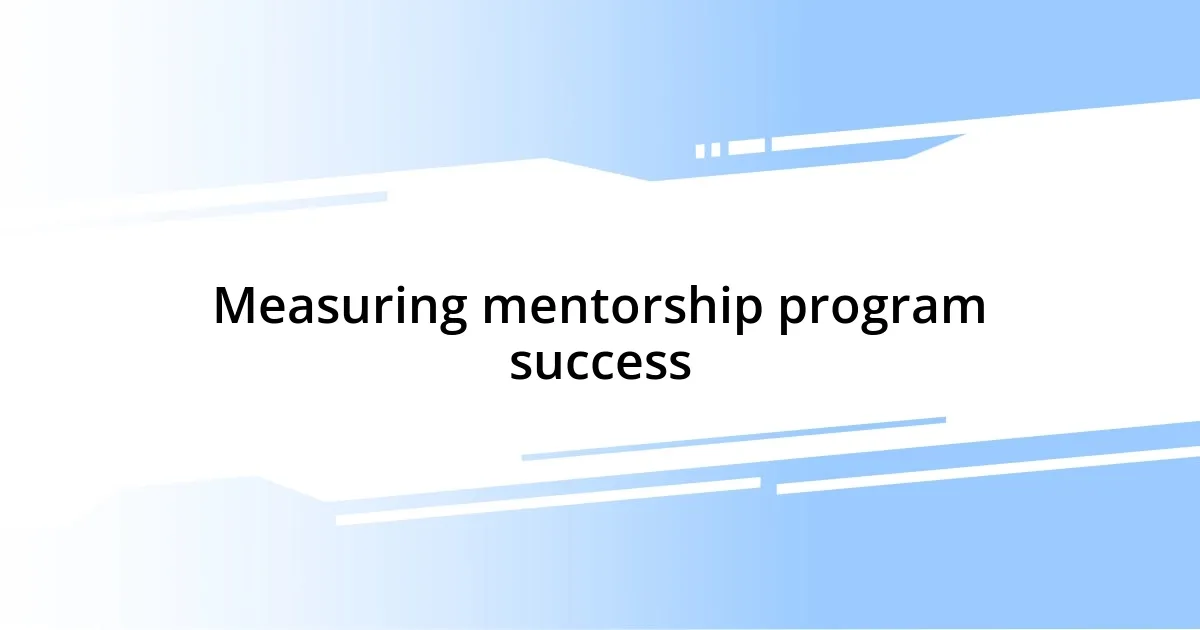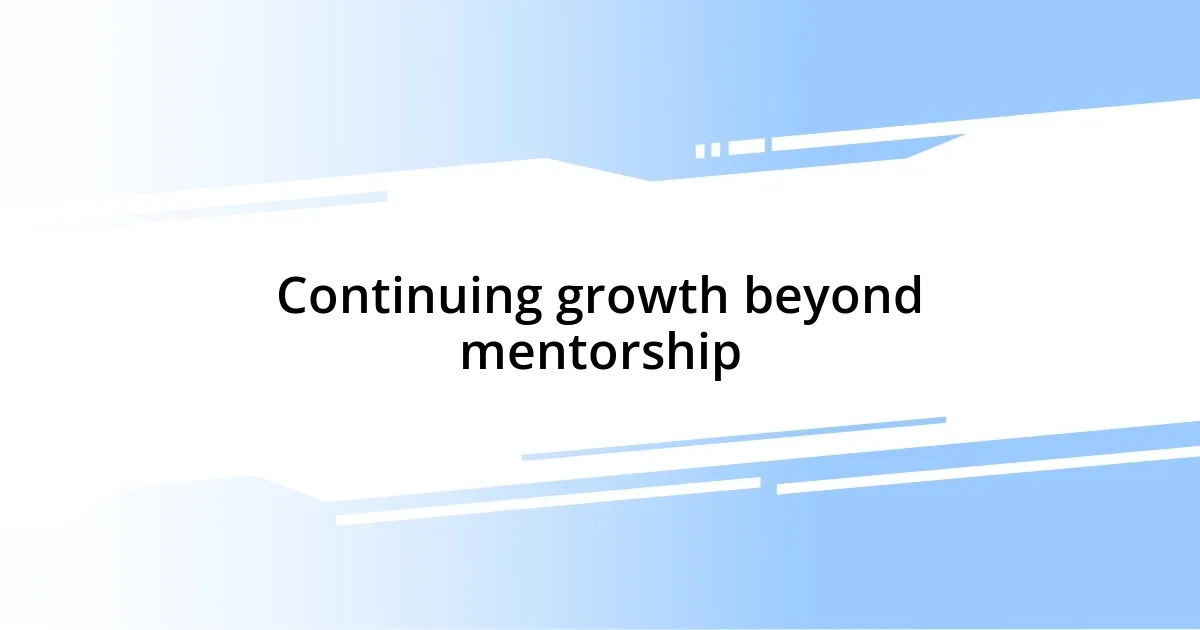Key takeaways:
- Mentorship provides emotional support and fosters confidence, impacting career development significantly.
- Effective mentors possess qualities like empathy, adaptability, and trustworthiness which enhance the mentoring relationship.
- Choosing the right mentor involves aligning values, ensuring relevant experience, and seeking genuine investment in your growth.
- Maintaining ongoing connections after formal mentorship enriches professional development and sustains growth beyond initial guidance.

Importance of mentorship programs
Mentorship programs hold immense value in personal and professional development. I remember when I first entered the workforce, feeling overwhelmed and unsure of my abilities. A mentor took me under their wing, guiding me not just through practical skills, but helping to build my confidence. Isn’t it incredible how one relationship can shape our career paths?
The emotional support provided by mentors can be transformative. It’s not merely about career advice; it’s about having someone who believes in you, which can be a game-changer during challenging times. I often reflect on moments when my mentor encouraged me to pursue opportunities I doubted I was ready for. Isn’t it amazing how powerful that belief can be?
Moreover, mentorship fosters a culture of learning and growth. In my experience, mentors have introduced me to networks and resources that I would have never accessed on my own. How often do we miss out on opportunities simply because we lack guidance? Programs that cultivate these relationships are essential in bridging the gap between potential and achievement.

Benefits of effective mentorship
Effective mentorship brings a wealth of benefits that can significantly influence one’s career trajectory. For instance, I recall being part of a mentorship program where my mentor, an industry veteran, shared invaluable insights about navigating office politics. It opened my eyes to this often-overlooked skill set, highlighting how powerful understanding interpersonal dynamics can be. Have you ever considered how relationships at work impact your success?
Additionally, the accountability factor that comes with mentorship is something I truly appreciate. My mentor consistently challenged me to set high standards and encouraged me to remain focused on my goals. This sense of responsibility pushed me out of my comfort zone, allowing me to exceed my expectations. Isn’t it amazing how having someone to answer to can spark our motivation?
Lastly, the mutual learning experience of mentorship is profound. I’ve found that while mentors impart knowledge, my feedback often helped them gain fresh perspectives. This reciprocal relationship fosters growth in both parties and cultivates a vibrant community. Have you experienced the joy of sharing ideas and insights with someone passionate about learning, just like you?
| Benefit | Personal Experience |
|---|---|
| Guidance and Insight | My mentor offered crucial advice that helped me navigate challenges I faced early in my career. |
| Accountability | Being accountable to my mentor kept me focused and driven toward my goals. |
| Mutual Learning | Sharing ideas with my mentor led to innovative solutions we both benefited from. |

Key qualities of successful mentors
Successful mentors embody a unique set of qualities that not only elevate their capabilities but also nurture those they guide. One quality that stands out to me is empathy. My own mentor had a remarkable ability to listen and truly understand my challenges. When I shared my struggles, she didn’t just offer solutions but shared her own experiences, making me feel less alone. This created a safe space for open dialogue, allowing me to grow in ways I didn’t anticipate. Mentorship is about connection, and empathy bridges that gap beautifully.
Another key quality is adaptability. I remember times when my mentor had to pivot our discussions based on the direction my career was taking. It wasn’t a rigid approach; rather, it felt like we were collaborating to navigate my journey. A successful mentor recognizes that each mentee has unique needs and may require different guidance at various stages. This flexibility is crucial in ensuring that the mentorship remains relevant and impactful.
Here are some essential qualities that define successful mentors:
- Empathy: Understanding and relating to the mentee’s experiences.
- Adaptability: Adjusting mentorship strategies based on individual needs and progression.
- Effective Communication: Conveying ideas clearly and encouraging open discussions.
- Trustworthiness: Building a safe relationship where mentees can share openly without fear of judgment.
- Expertise and Knowledge: Offering insights from their own experiences to guide mentees effectively.

How to select a mentor
Selecting the right mentor is a crucial step in a successful mentorship journey. I’ve always believed that a mentor should embody the qualities that resonate with you personally. For example, I once had an opportunity to connect with someone whose work ethic and values mirrored my aspirations. It felt energizing to learn from someone whose experience directly aligned with my goals. Have you thought about what values you want to see reflected in your mentor?
It’s also important to consider your mentor’s experience and expertise relevant to your field. Imagine embarking on a new project without having someone to offer guidance during challenging times. I remember feeling lost in the early stages of my career until I collaborated with a mentor who had walked a similar path. Her tailored advice was not just beneficial; it was transformative. Don’t you think having that kind of targeted support can make all the difference?
Lastly, look for someone who genuinely invests time and effort into mentoring others. A mentor who provides consistent feedback and shows genuine interest in your progress can impact your growth immensely. I recall one mentor who regularly scheduled follow-ups, turning those casual chats into crucial check-in moments. It reinforced my sense of accountability and made me feel valued. Have you found someone who takes the time to nurture your journey like this?

Building a productive mentor relationship
Building a productive mentor relationship requires intentionality, and I’ve found that clear communication is key. In one mentorship, I started setting aside time each week to discuss my progress and challenges. This consistent dialogue was so effective; it not only kept us aligned but also deepened my understanding of my own goals. Have you ever experienced the magic that comes from regular check-ins?
Trust plays a pivotal role in the mentorship dynamic. I remember a time when I was hesitant to share a setback due to fear of judgment. However, when I finally opened up, my mentor responded with nothing but encouragement and understanding. That moment transformed our relationship, reinforcing my belief that vulnerability can lead to deeper connections. Can you see how trust can pave the way for greater honesty in your journey?
Another essential aspect is mutual respect. I’ve encountered mentors who not only guided me but also valued my insights and experiences. I once shared an idea during a brainstorming session, and my mentor took the time to consider my perspective seriously. That acknowledgment empowered me and fostered a sense of equality in our relationship. Have you noticed how respect can inspire both growth and collaboration?

Measuring mentorship program success
Measuring the success of a mentorship program can be quite nuanced. I often find that one of the most telling indicators is the degree of personal growth participants experience. In my own journey, I remember setting specific goals at the outset of my mentorship; when I revisited those goals after six months, the progress I had made left me amazed. Have you ever tracked your growth in a similar way?
Another factor to consider is the quality of the mentor-mentee relationship itself. I once participated in a program where we were encouraged to reflect on our interactions regularly. This practice opened my eyes to how the strength of our connection influenced my learning and willingness to take risks. Think about it—aren’t you more likely to grow when you feel genuinely supported?
Lastly, feedback plays an essential role in gauging success. After completing a mentorship program, sharing insights about what worked and what didn’t can help refine the experience for future participants. I vividly recall a feedback session where I discussed the impactful moments during my mentorship; it was uplifting to recognize how others benefited from similar experiences. Have you ever contributed to the evolution of a program with your own insights?

Continuing growth beyond mentorship
Continuing growth beyond mentorship is an essential and often overlooked aspect. After my mentorship experience, I realized that the skills and insights I gained weren’t confined to those meetings. They became the foundation for my future endeavors. I remember taking on a challenging project soon after; I found myself drawing from the strategies I learned during mentoring sessions. Isn’t it incredible how past guidance can illuminate new paths in our lives?
Something I cherished from my experience was the realization that mentorship doesn’t end with the final farewell. I often reach out to my mentor for occasional advice, and that ongoing connection has been invaluable. There’s something comforting in knowing that this relationship is not just a one-off; it evolves as my career does. Have you think about how these connections could continue to drive your growth long after formal mentorship ends?
Furthermore, the principles you’ve learned can serve as a guiding compass in your professional life. I often reflect on the feedback I received about vulnerability and openness. Embracing these values helped me build stronger professional relationships, transforming challenges into opportunities. It’s like having a toolkit filled with resources that you can revisit time and again. How have you integrated teachings from past mentors into your daily practices?














